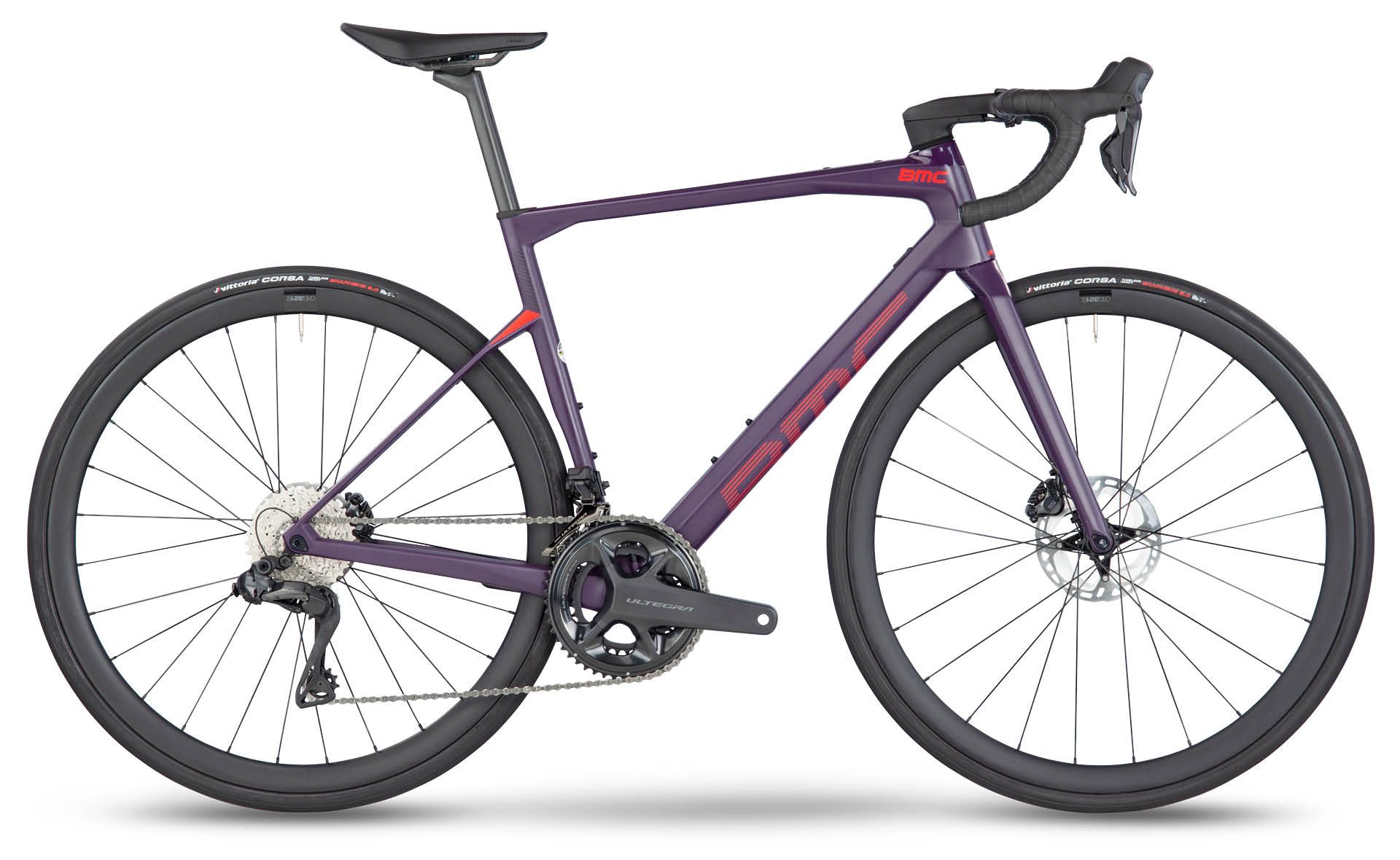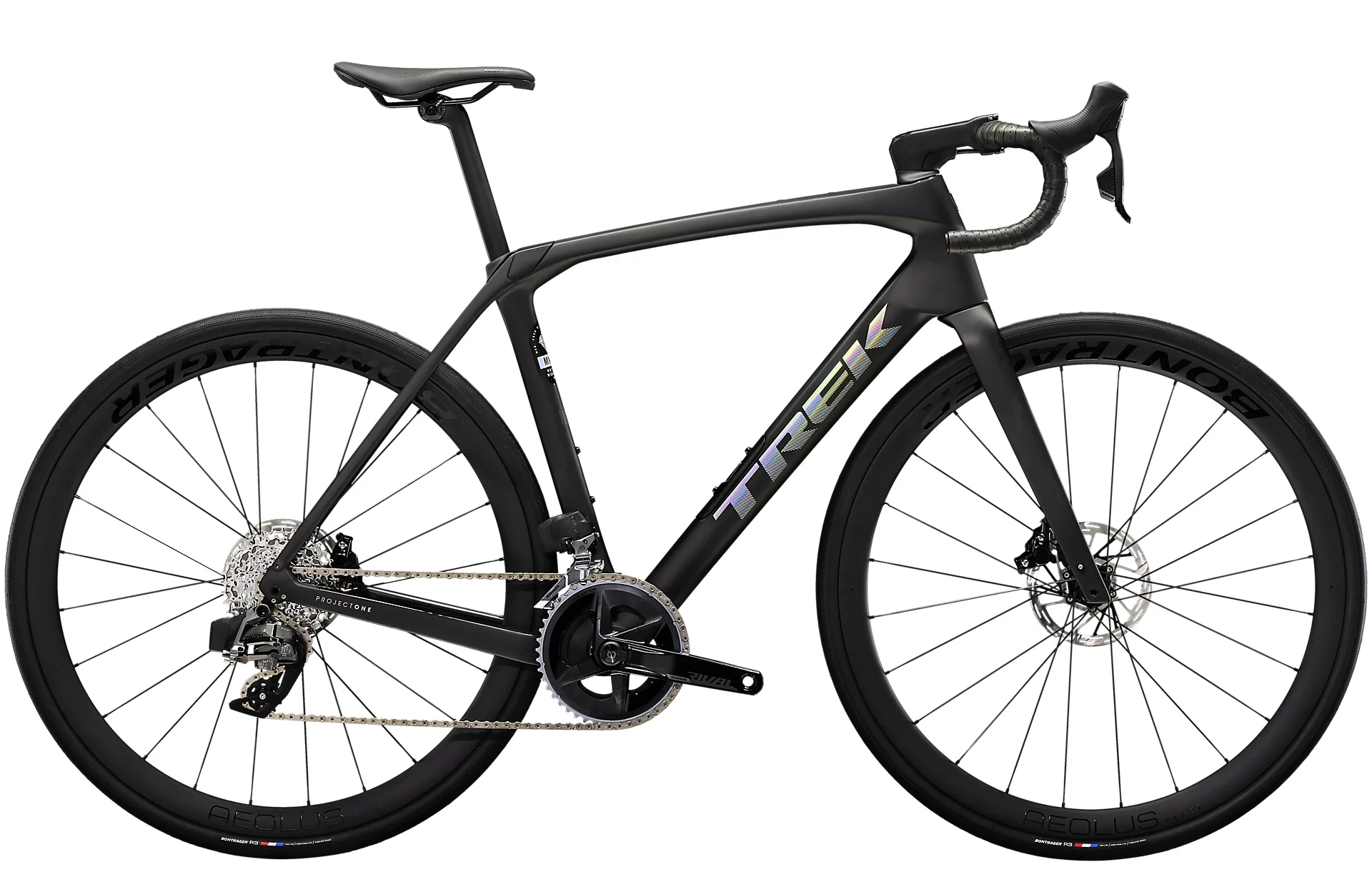In this comparison, I’ll dissect two popular bike models; the BMC Roadmachine vs Trek Domane.
I’ll compare their lineups, bike specifications, and suggested retail prices in USD, then discuss the carbon fiber technology (BMC ACE+ and Trek OCLV) and frameset technologies.
The goal is to give you a better understanding of BMC Roadmachine and Trek Domane to help in your decision-making.
| BMC Roadmachine | Trek Domane | |
|---|---|---|
| Type of bike | Endurance | Endurance |
| Frame material | Premium 01 carbon Premium carbon | OCLV 800 carbon OCLV 500 carbon |
| Frame sizes | 47, 51, 54, 56, 58, 61 | 44, 49, 52, 54, 56, 58, 61, 64 |
| Groupset | Shimano, SRAM (12-speed) | Shimano, SRAM (12-speed) |
| Brakes | Hydraulic disc | Hydraulic disc |
| Cabling | Internal | External |
| Price (USD) | $3,399 to $12,699 | $4,699 to $13,199 |
BMC Roadmachine

The BMC Roadmachine is an endurance bike.
The BMC Roadmachine has a more relaxed geometry compared to the Teammachine. It has a carbon fiber layup geared towards more comfort, especially over rough roads, at the expense of high performance and stiffness.
There are two versions available; BMC Roadmachine 01 (higher grade) vs BMC Roadmachine (standard). Both have the same frame geometry but differ in carbon fiber grade (Premium 01 Carbon vs Premium Carbon) and internal vs external cable routing.
| Model | Frame material | Groupset | Wheelset | Retail price (USD) |
|---|---|---|---|---|
| BMC Roadmachine 01 One | Premium 01 carbon | SRAM Red eTap AXS | Zipp 303 Firecrest | $12,699 |
| BMC Roadmachine 01 Two | Premium 01 carbon | Shimano Dura-Ace Di2 (R9200) | DT Swiss ERC 1100 | $12,999 |
| BMC Roadmachine 01 Three | Premium 01 carbon | Shimano Ultegra Di2 (R8100) | CRD-321 SL Carbon | $8,899 |
| BMC Roadmachine 01 Four | Premium 01 carbon | SRAM Force eTap AXS | CRD-321 SL Carbon | $8,299 |
| BMC Roadmachine 01 Five | Premium 01 carbon | Shimano Ultegra Di2 (R8100) | CRD-321 SL Carbon | $7,299 |
| BMC Roadmachine One | Premium carbon | Shimano Ultegra Di2 (R8100) | CRD-321 | $6,499 |
| BMC Roadmachine Two | Premium carbon | SRAM Force eTap AXS | DT Swiss E1800 | $5,999 |
| BMC Roadmachine Three | Premium carbon | Shimano 105 Di2 (R7100) | XRD-522 | $5,599 |
| BMC Roadmachine Four | Premium carbon | SRAM Rival eTap AXS | XRD-522 | $5,199 |
| BMC Roadmachine Five | Premium carbon | Shimano 105 Di2 (R7100) | Mavic Open Disc | $4,599 |
| BMC Roadmachine Six | Premium carbon | Shimano 105 (R7000) | Mavic Open Disc | $3,399 |
BMC Roadmachine vs others
Trek Domane

The Trek Domane is designed as an all-day endurance bike.
It can also be referred to as all-road as its wider tire clearance of up to 38c can tackle hard-packed gravel and cobblestones like those in the Paris-Roubaix race. Trek built the Isospeed dampening system in the front and rear to achieve this.
There are carbon and aluminum versions of the Domane. The SLR uses the higher grade, OCLV 800 carbon compared to the SL on the standard, OCLV 500 carbon.
The Trek Domane SL and SLR frames are also available separately for those after a custom-built bike.
| Model | Frame material | Groupset | Wheelset | Retail price (USD) |
|---|---|---|---|---|
| Trek Domane SLR 9 AXS | OCLV 800 carbon | SRAM Red eTap AXS | Bontrager Aeolus RSL 37 | $13,199 |
| Trek Domane SLR 9 | OCLV 800 carbon | Shimano Dura-Ace Di2 (R9200) | Bontrager Aeolus RSL 37 | $12,749 |
| Trek Domane SLR 7 AXS | OCLV 800 carbon | SRAM Force eTap AXS | Bontrager Aeolus Pro 37 | $9,699 |
| Trek Domane SLR 7 | OCLV 800 carbon | Shimano Ultegra Di2 (R8100) | Bontrager Aeolus Pro 37 | $8,549 |
| Trek Domane SLR 6 AXS | OCLV 800 carbon | SRAM Rival eTap AXS | Bontrager Aeolus Pro 37 | $8,399 |
| Trek Domane SLR 6 | OCLV 800 carbon | Shimano 105 Di2 (R7100) | Bontrager Aeolus Pro 37 | $7,999 |
| Trek Domane SL 7 AXS | OCLV 500 carbon | SRAM Force eTap AXS | Bontrager Aeolus Pro 37 | $7,499 |
| Trek Domane SL 7 | OCLV 500 carbon | Shimano Ultegra Di2 (R8100) | Bontrager Aeolus Pro 37 | $6,829 |
| Trek Domane SL 6 AXS | OCLV 500 carbon | SRAM Rival eTap AXS | Bontrager Paradigm Comp 25 | $5,299 |
| Trek Domane SL 6 | OCLV 500 carbon | Shimano 105 Di2 (R7100) | Bontrager Paradigm Comp 25 | $4,699 |
BMC vs Trek carbon fiber
BMC ACE+
The BMC ACE+ (Accelerated Composites Evolution Technology +) is the latest carbon fiber layup technology used on all BMC road bikes.
ACE+ operates by determining the cross-sections of the frame, the arrangement of the carbon layers, and the geometric structure based on targeted performance values. Subsequently, it generates thousands of virtual models to pinpoint the ideal equilibrium of performance, focusing on three fundamental aspects; Stiffness, Weight, and Compliance.
BMC has two different carbon grades, 01 Premium Carbon and Premium Carbon, in their road bike frames. The choice between the two carbon grades depends on the rider’s preferences, budget, and desired level of performance.
- 01 Premium Carbon is a high-grade carbon fiber material with superior performance, stiffness, and weight savings. It provides enhanced ride quality with improved power transfer and responsiveness. Premium 01 carbon is used on all BMC models with 01, such as Teammachine SLR01 and Roadmachine 01.
- Premium Carbon is a mid-range carbon fiber material that balances performance, weight, and affordability. It is used on all BMC models without the 01.
Trek OCLV carbon
The OCLV (Optimum Compaction, Low Void) carbon is a proprietary carbon fiber manufacturing technology developed by Trek.
- Optimum Compaction refers to the heat and pressure applied during the curing process to squeeze out excess resin and ensure that the carbon layers are compacted to the optimal density.
- Low Void refers to the goal of reducing microscopic air pockets or voids that can occur in the carbon fiber and create weaknesses.
One of the key advantages of OCLV carbon is its ability to achieve an optimal balance between stiffness, strength, and weight. Trek engineers carefully tune the carbon layup and utilize varying modulus carbon fibers to create stiff frames in certain areas to maximize power transfer while maintaining compliance in other areas to enhance comfort and ride quality.
The OCLV carbon is available in 800 and 500 series.
- OCLV 800 is the highest-grade carbon fiber used by Trek. The carbon modulus is higher in OCLV 800, making it stiffer and lighter. The manufacturing process is more refined, using more advanced carbon and resins, leading to a bike frame that provides top performance levels for stiffness, weight, and strength. OCLV 800 is used in all models with SLR.
- OCLV 500 is a lower-grade carbon but still offers a high level of performance. It has a slightly lower carbon modulus, meaning it’s a bit less stiff and heavier than OCLV 800. OCLV 800 is used in all models with SL.
It’s worth noting that the different OCLV grades don’t only refer to the material itself, but also to the manufacturing techniques used to form the carbon fiber into bike frames. Higher-grade carbon requires more precise manufacturing techniques to take full advantage of its superior material properties.
Frameset technologies and innovations
BMC Roadmachine and Trek Domane framesets incorporate advanced technologies to enhance their bikes’ performance and ride characteristics.
Here’s an overview of the technologies used in each bike model.
BMC Roadmachine
| Name | Description |
|---|---|
| Integrated Cockpit System (ICS) | Seamlessly integrates the handlebar, stem, and fork to improve aerodynamics, enhance stiffness, and provide a clean, integrated look. The elimination of external cables reduces drag and improves handling responsiveness. |
| Tuned Compliance Concept (TCC) | TCC optimizes vertical compliance by strategically tuning the carbon layup and tube shapes. This technology improves the frame’s ability to absorb road vibrations and bumps, resulting in a smoother and more comfortable ride without sacrificing performance or power transfer. |
| D-Shaped Seatpost | BMC’s D-Shaped Seatpost features a flattened shape that enhances vertical compliance and comfort by absorbing road vibrations. This design provides a smoother ride experience, particularly during long-distance or rougher road surfaces, while maintaining aerodynamic performance. |
Trek Domane
| Name | Description |
|---|---|
| OCLV Carbon | Optimum Compaction, Low Void (OCLV). A carbon fiber technology used in Trek frames. Employs advanced layup techniques and precise carbon compaction to create lightweight, strong frames with a balanced blend of stiffness and compliance. Available in two grades; OCLV 800 and 500. A higher number indicates a higher grade carbon. |
| H1.5 geometry | Trek’s geometry design that strikes a balance between aggressive racing positioning (H1) and rider comfort (H2). H1.5 geometry provides a slightly more relaxed riding position than the racier H1 geometry, making it suitable for a wider range of riders. |
| IsoSpeed Technology | An innovative solution for improving rider comfort on rough surfaces. The IsoSpeed decoupler allows the seat tube to flex independently from the rest of the frame, increasing vertical compliance and smoothing road vibrations. |
| Project One | Trek’s customization program that allows riders to create personalized and unique bikes. With Project One, riders can customize various aspects of their bikes, including frame color, paint scheme, components, drivetrain, wheels, and other details. |
Where to buy
BMC retailers
- BMC retailers. Use this tool to find your nearest BMC retailers.
Trek shops
- Trek online shops. Australia, Austria, Canada, Germany, Netherlands, United Kingdom, United States
- Trek retailers. Use this tool to find your nearest Trek retailers.

Alex Lee is the founder and editor-at-large of Mr. Mamil. Coming from a professional engineering background, he breaks down technical cycling nuances into an easy-to-understand and digestible format here.
He has been riding road bikes actively for the past 12 years and started racing competitively in the senior category during the summer recently.